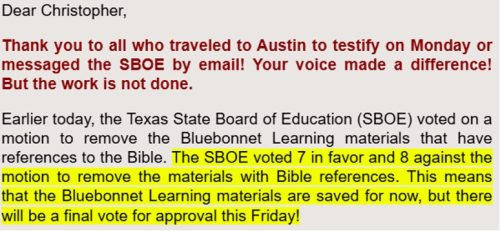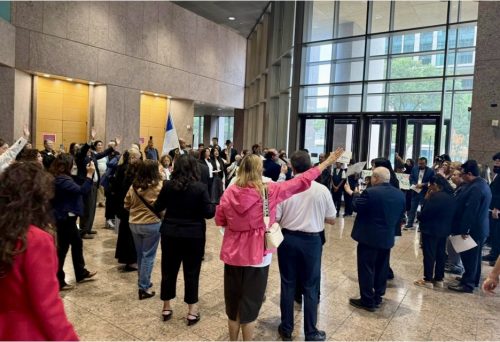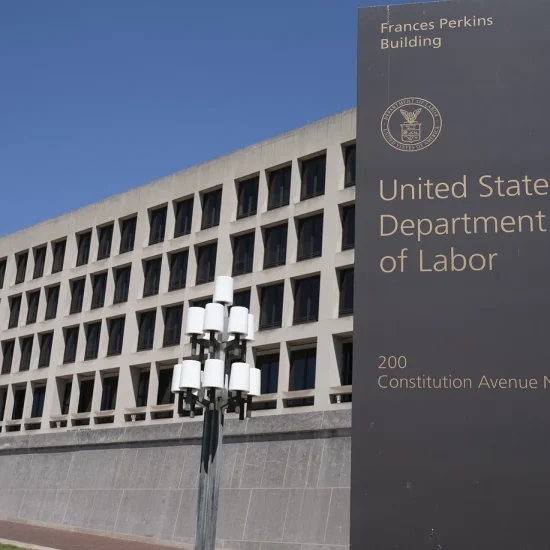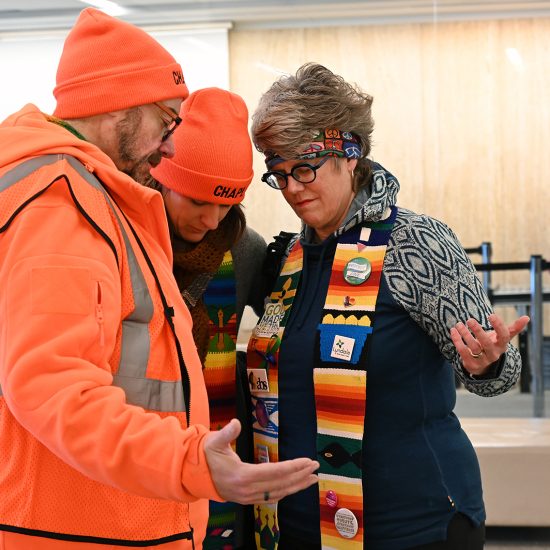
History has a special place in education. It is what establishes an identity, teaches values, and passes on commitments within communities. It is a discourse between those who came before us, the people we are becoming, and the story we want to tell. As a Texas social studies teacher, the challenge becomes balancing the “patriotic” education promoted by the state and a more critical version I have come to believe. With the state promoting school voucher programs to fund private education and pushing Christian values into public education, it leaves little room for dialogue or discourse on the matter. It tells a tale of a Christian nation with “tolerance” for other religions but no place in the country’s history.

Christopher Symms
For my first year of teaching in the public school system, my time is split between 7th grade Texas History and 8th grade U.S. History. Contrary to popular belief, I have little control over what is taught in the classroom. The history department gathers to plan and adjust the curriculum based on what the state has deemed essential. Some lessons allow me to provide extra insights into the subject matter from my research in graduate school. However, it becomes less of a priority with grades, meetings, and behavior reports. I am more of a messenger, delivering the story designed for me to teach.
As the election between Kamala Harris and Donald Trump grew closer, my students began to have many questions about voting and the election process. Among these quick conversations were remarks about the religious beliefs of Harris and Trump. Many of my students are Christian and have expressed their concern about having Harris in office because of popular controversies. I struggle to articulate a response to these comments in the two-minute conversation before the bell rings. My typical answer is that history requires us to hold many perspectives all at once.
When discussing the first five amendments included in the Bill of Rights, I decided to show a short clip from a PBS documentary on freedom of religion and the separation of church and state. This was the perfect opportunity to address the history behind the importance of religious freedom in the First Amendment. We could also address the history of the phrase “Under God” in both the national and state pledges we say every day in school. This would hopefully give them a different perspective in which to view the current political climate and resonate with some of their interests.
The video showed Jessica Ahlquist, a student at Cranston West High School in Rhode Island, who wanted a school prayer taken down from the auditorium. She felt unwelcome and asked for the school to remove the banner. Of course, many comments began to fly around my classroom, “What’s wrong with the prayer?” “Why is this a big deal?” As the video continued, a school board meeting was held to discuss the issue of the lawsuit. Parents and community members began jeering “One nation, under God” in hopes that the court would uphold religious freedom within the school. I looked around, and some were dismayed by the parent’s reaction toward a high school student while others were mouthing the words and cheering them on. Some dozed off.
Only in moments like this PBS documentary do I get to dive into the nuance behind such assumptions. Yet, this is 5-7 minutes inside of a 40-minute lesson on a day that allows for it.
This issue has become more prevalent for students over the last few months. The election cycle has proven successful for the Republican party of Texas with more than half of the Senate winning seats. 11 out of 15 official advocates for school choice have been elected and Texas Governor Greg Abbott feels hopeful in implementing the program this time around. The state will most likely have its wish on both fronts. The state will begin to fund private Christian schools while also funding Bibles in public schools.
I have written previously on the issue of school vouchers and organizations supporting its cause. Texas Values, a Christian lobbying organization that promotes “family faith, and freedom” began sending endorsement emails out to their supporters. The top of the endorsement list was Ted Cruz, who was recently reelected as U.S. Senator for Texas. This organization continues to pressure school board meetings around the state in hopes of reinstating the Bible as one of the country’s founding documents.

Image taken from endorsement email from Texas Values, November 19th, 2024
After winning the spot for U.S. Senator, Texas Values shared with their supporters Ted Cruz’s endorsement and gratitude for their organization. He emphasized the importance of fighting against the “growing ideology of wokeism that seeks to distort the truth and to undermine the foundation of our Values. They seek to erode the very freedoms that define us as Americans.”
Moreover, Governor Greg Abbott spoke at Kingdom Life Academy in Tyler, Texas on behalf of school choice. The program sends the message that it diversifies education by allowing parents to decide rather than being controlled by the state. Yet Greg Abbott’s appearance at Kingdom Academy also reveals the program’s audience — private Christian schools.
On September 13th, Rev. Dr. Jonathan Davis, a Texan Christian pastor, seminary professor, and Director of Development of the Baptist Joint Committee for Religious Liberty, advocated against implementing the Bible in the Texas Curriculum. The plan also has an incentive for schools to adopt by giving each school $60 per student if the district accepts the new material. He was then asked if he “believed the Bible to be 100% historically accurate.” When trying to explain the nuance of that question, they demanded a straightforward “yes or no.”
Arriving Monday, November 19th, Davis found a group gathered at the State Board of Education meeting waving a Christian flag while singing and praying. They prayed that the “enemy” would not prevail in public schools. Davis understood the enemy to be those like him who advocated against the Bible in schools. He spoke to the board again on Tuesday, November 19th, urging the State Board of Education to reconsider their decision: “The proposed lessons privilege the Christian faith above all others … America is not now, nor have we ever been a Christian nation, but if these lessons are taught in public schools students will no doubt be left with the impression that other religions are merely tolerated in our society.”

A Texas State Board of Education meeting on Monday, November 18th. (Rev. Dr. Jonathan H. Davis)
His testimony pinpoints the key issue revolving around the idea of religious freedom. Does it support religious pluralism and other religious voices in our history, or will it prioritize a Christian narrative?
The state of Texas made its final decision on November 20th with a narrow 8-7 vote. The new biblically based materials will be accepted and incentivized in public schools.
Little room for discourse over the nuance of these matters is also reflected in the classroom. I am there to tell a story focused on the characters and events that are meaningful to the State Board of Education. Some days I facilitate dialogue like the one I shared above. Other times I can fill in characters to stories I want to that I believe are important to tell. But I am severely limited.
To add to my curriculum, it requires shortening the original lesson and material students will be tested on. Moreover, the students will tend to remember the characters I add to the story because of the natural passion I have for them. As a result, their test scores are lower because they did not remember the “important” material deemed worthy by the state.
From my perspective as a public school teacher, there is no school choice in Texas. The state is incentivizing schools to accept a curriculum with biblical lessons while simultaneously funding private Christian academies. There is little room for discourse in these matters and will continue to push a narrative that the United States is a Christian nation. Ted Cruz was right when he said that “Texas is in a leadership position to set the tone for the rest of the world” and the state will continue to shape the identity of its students to help fulfill that role.
Christopher Symms is a graduate of Portland Seminary and a Texas public school teacher. You can find him on Instagram: christophersymms and X: @chris_symms.






